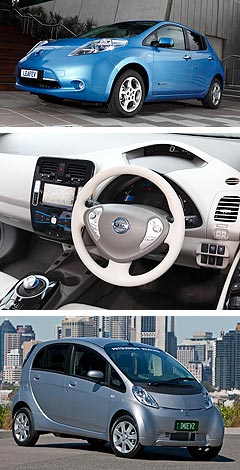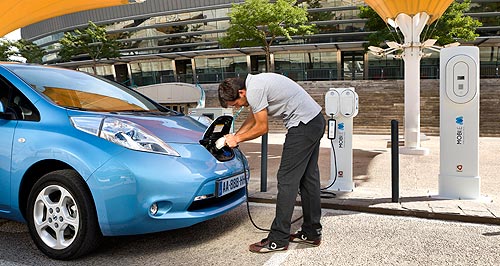News - NissanNissan joint-venture to reduce EV quick charger costCharged less: Nissan’s mooted halving in cost of quick chargers for electric vehicles is expected to encourage businesses to install and run the units for profit. European Nissan deal to proliferate compact, low-cost ‘30 minute’ EV quick chargers21 Sep 2011 RANGE anxiety among EV drivers could become a thing of the past sooner than expected with a European joint-venture spearheaded by Nissan promising a proliferation of quick charge points across Europe by 2015, resulting from a halving in equipment costs. The Japanese car-maker is teaming up with European utility and electrical supply equipment companies Circutor, DBT, Efacec, Endesa and Siemens with the aim of developing a relatively low-cost and compact quick charger costing less than €10,000 ($A13,370) by early next year. Such a dramatic reduction in price is hoped to encourage and enable businesses such as service stations, car park operators, supermarkets and shopping centres to install and run charging stations for profit. If this comes to fruition, Nissan – which already has its acclaimed electric Leaf hatch on sale in several markets and will introduce it to Australia next April – expects there to be “thousands” of public EV quick chargers across Europe by the end of next year, expanding to “tens of thousands” by 2015.  Left: Nissan Leaf. Below: Mitsubishi i-MiEV. Left: Nissan Leaf. Below: Mitsubishi i-MiEV.Nissan Australia head of corporate communications Jeff Fisher said he hoped Australia would not be too far in following Europe and Japan in the introduction of the low-cost quick charging technology. He said the quick chargers are going to make a big difference in getting EVs accepted by motorists, adding that in the medium term business and infrastructure owners installing quick chargers will help the take-up of electric cars and that he expected EV drivers will be coming to them and demanding the facility. The prospect of a quick recharge is also expected to enable EV drivers to use their cars for longer journeys, with stops not much longer than traditionally required for a conventional tank top-up and coffee break. In is media release Nissan claims the expanded infrastructure “will open up Nissan Leaf ownership to a whole new spectrum of buyers who occasionally need to do longer journeys”. Nissan COO Toshiyuki Shiga said that although the company is confident the Leaf’s range is enough for the daily needs of most drivers, he believes infrastructure that gives drivers the confidence to travel longer distances on electric power is “essential for the mass adoption of EVs”. A quick charger from Japanese company CHAdeMo – who supplied Australia’s first public fast charger, located at Mitsubishi’s head office in Adelaide – is cited by Nissan as delivering 50kW of high voltage direct current (DC) to the EV battery, “speeding up the charging process”. Combining Japanese charging technology with the “strength of our European partners’ know-how” is expected to hasten the development of the low-cost quick charger and ease its rollout. Nissan says the chargers are compliant with European charging policies and will be compatible with future EVs that charge using alternating current (AC). “A quick charge allows the battery to be topped up in little more time than it takes to refuel a conventional car, and of course the owner can leave the Nissan LEAF while it is being ‘refueled' to make calls, have lunch or take a break.” As GoAuto has reported, Australian-delivered Leafs will come as standard with a fast-charge port, because when it was offered as an option in the US market, the majority of buyers ticked the box. The Leaf will also be capable of plugging into a standard 240-volt 15-amp household electricity system for home charging, which takes up to seven hours. Australian market Leafs will also get a full telematics pack that links the Leaf to the mobile phone network, providing a range of driver functions such as data on range and energy consumption, location of charging stations and using a mobile phone to turn on the air-conditioning or heater. No Australian pricing has yet been announced, but in the UK market the Leaf costs £2000 ($A3065) more – before a £5000 government EV incentive – than the smaller Mitsubishi i-MiEV that retails in Australia for $48,800 plus on-road costs. Customer deliveries of Nissan’s Leaf have begun in seven European countries, with order books open in five more.  Read more10th of August 2011  Australia to get upgraded Nissan Leaf2012 tweaks for Nissan’s Leaf EV locked in ahead of Australian launch next April5th of July 2011  GoAuto to trial LeafNissan delivers 16 Leafs for Victorian government EV fleet trial including GoAuto17th of June 2011  Smooth sailing for Aussie Leaf launchNissan Australia confirms April launch and no local castings plant delay for Leaf EV |
Click to shareNissan articlesResearch Nissan Motor industry news |
















Facebook Twitter Instagram